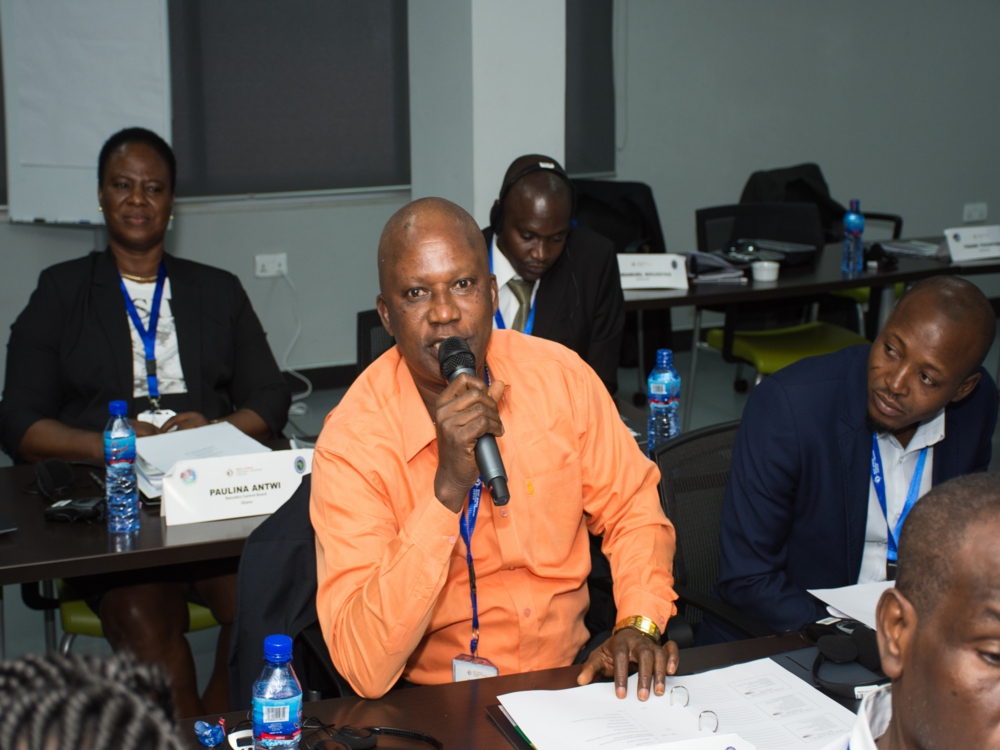Alumni in Focus
Mr. James

Mr. James
Special Agent
Special Agent James at the RTC
In this month’s ‘Alumni in Focus” segment, I sat down to interview an alumnus from Liberia, who recently worked on a major drug case at Liberia’s Robert International Airport. Mr. James is an alumnus of the Center, having attended two courses delivered by U.S. Drug Enforcement Administration (DEA). I hope you enjoy reading this as much as I enjoyed writing it.
Could you briefly give an introduction of yourself, focusing on your law enforcement career?
"My name is Special Agent James and I currently work with the Liberia Drug Enforcement Agency (LDEA). I began my law enforcement career as a police officer for fourteen years. I joined the LDEA after leaving the police force and I have been with the LDEA for the last nine years. I’ve had several training opportunities, both locally and abroad, having trained with INTERPOL and DEA. I took over the airport detail in 2013 and I’m currently the chief of LDEA at Liberia’s International Airport. I made my very first arrest on my first day on the job!"
Tell me more about your experience with LDEA at the airport and some of the challenges you face?
"At the time I took over as Chief at the airport, trafficking of narcotics was very rampant but I can confidently say that we have seen a sharp decline in drug trafficking in recent months. One thing my team is best known for is the identification of swallowers and most recently, we have made several arrests at the airport. Unfortunately, our weakest area is that we lack the necessary resources needed for screening cargo for narcotics. Evidently, the traffickers take advantage of this loophole in our operations. But when it comes to individual carriers, we are ready for such operations. We recently arrested a passenger who was carrying four kilograms of heroin concealed in body lotion containers. I am very proud of the work we are doing at the airport."
Let’s talk about the training you received at the RTC. Would you say that the training has enhanced your skill set?
"Yes, absolutely. My first RTC course was the Basic Drug Investigations course. That course taught me so much and I gained knowledge on case initiation as well as how to gather and analyze evidence. I also learnt the process of intelligence analysis and during that training I made some important connections with my counterparts in Ghana. Liberia works closely with Ghana on drug related cases and my agency has developed a strong relationship with Ghana’s Narcotics Control Board. These counterparts supply reliable information on suspected targets heading for Liberia and now, we share information on a regular basis. The course I am currently attending, that is, the Airport Interdiction course, is very relevant to my career since it relates directly to our operations at the airport. I have received much knowledge from the DEA instructors as well as from the other participants on how to conduct searches, smuggling and methods of concealment."
The RTC constantly emphasizes the need for regional cooperation in the drug fight. Based on your work and current trends, would you agree with the need for collaboration?
"I always say this to my agents- the only way to fight drug trafficking is to transmit information. Drug routes change constantly. What we are currently observing, based on the cases we work on, is that heroin leaves Asia, through East Africa before finally arriving in West Africa. Let me narrate a recent example. We arrested a Nigerian national, possessing a diplomatic passport from Guinea Bissau (we had received information from Guinea Bissau to be on the lookout for a stolen diplomatic passport). He was carrying four kilos of cocaine from South America and he travelled through East Africa. In another recent case, we received a tip from our counterparts in Ghana about a suspect who travelled through multiple African countries. He departed Liberia, stopped over in Ghana, proceeded to Kenya and then to Rwanda and finally landed in Burundi. After collecting the consignment, he came back to Liberia, via the countries listed above. These are just few prominent examples that demonstrate the need for collaboration amongst law enforcement entities in the region, to combat drug crimes."
Finally, if you could request additional training, what would be your top training needs?
"Well since I work at the airport, my first training request would be for additional airport interdiction courses. I would be glad if we could receive training assistance on drug and suspect identification methods. Subsequently, any kind of training that deals with intelligence gathering and analysis will be highly appreciated. My last comment would be to humbly request that the number of slots allocated to Liberia, be increased so that we can get the necessary training for our agents."
We at the RTC love hearing about your success stories demonstrating the impact of our trainings. To share your story, please write to us at info@westafricartc.org and we will get the conversation started.
